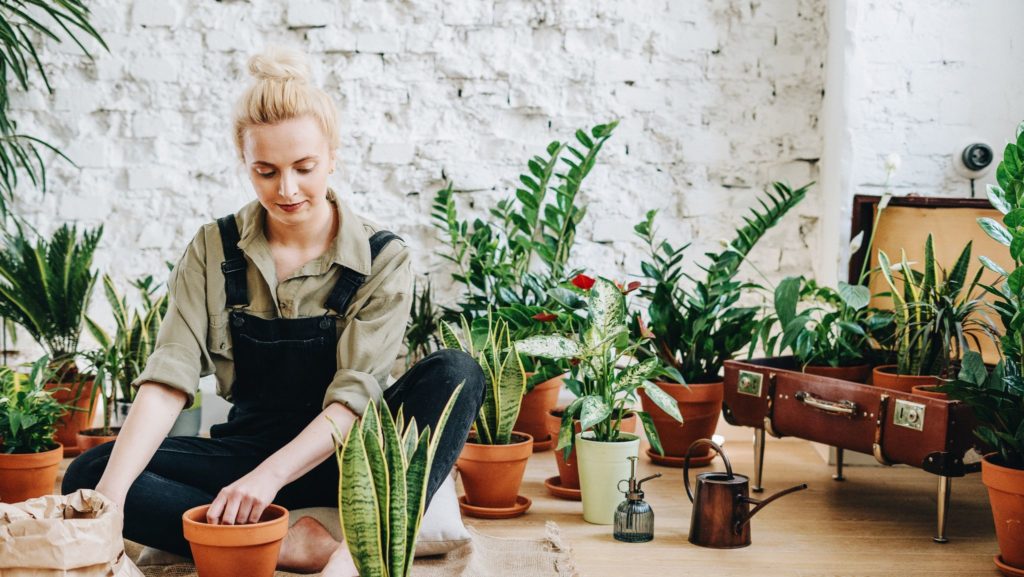The average person spends more than 85 percent of their time indoors, maybe more so because of COVID-19. So it’s no surprise that quarantine has made plant parents of a lot of us. But the human connection with plants is ageless; countless studies have analyzed the mental health benefits of keeping indoor foliage.
People have been keeping potted plants as far back as ancient Egypt, Babylon, and Rome. Wealthy Victorians embraced houseplants as a way to brighten the dull, dreary English winters. In the 1970s, the decade of the world’s first Earth Day, there was an indoor foliage boom and spider plants, snake plants, philodendrons, and tradescantias populated sunken living rooms everywhere. There was even a professional plant babysitter in Brooklyn.
Medical researchers in Japan have analyzed the mental benefits of shirin-yoku (forest bathing), finding that it not only improves mood and reduces stress, but it may also reduce blood pressure. The Internet aesthetic of “cottagecore,” which has understandably seen a surge in popularity during COVID-19, has romanticized living a quaint life in harmony with nature, wildflowers, and community gardens.
How Plants Can Improve Your Mental Health
The American Horticultural Therapy Association, a non-profit organization, advocates for the therapeutic power of caring for plants at home, in the healthcare industry, and in academics.
Horticultural therapy has been used since the late 19th century when Dr. Benjamin Rush, the “father of American psychiatry,” documented the positive effects that working with plants had on patients with mental illness. In the 20th century, horticultural therapy was no longer exclusively a treatment for mental illness. It was embraced by war veterans in the 1940s and 1950s.
Fast-forward to modern times, therapeutic gardens are in hospitals and care facilities, so more can benefit from everything that caring for plants has to offer. Many studies have also uncovered the benefits of having office plants.

Plant trends come and ago, but what they all have in common is that being around plants appears to have a positive effect on humans. There’s even a word for this innate connection: biophilia. Here’s what greening up your space may be able to do for your mental health:
Lower Anxiety and Stress
Multiple small studies have analyzed the relationship between being near indoor plants and lower stress levels. A 2015 study in the Journal of Physiological Anthropology found that interacting with indoor plants may reduce psychological and physiological stress. Another study from Japan concluded that even just gazing at a plant on your work desk may reduce anxiety levels.
If you want to add a little bit of greenery to your desk but you don’t get good sunlight, try something that tolerates low light, like sansevieria (snake plant) or a pet-friendly spider plant. There is also evidence that keeping flowers in your home may help you feel happier, more relaxed, and less stressed.
Better Concentration and Memory
Having trouble focusing at your (home) work desk? Being around plants may be good for your concentration at home and in the workplace.
Many studies suggest that plants have a calming effect. This may help with your ability to focus on a task and memory retention. A study from the University of Michigan found that spending time outside around plants can increase memory retention by up to 20 percent. Ornamental plants have also been shown to create a positive learning environment for children.
Boosts Creativity
Interacting with plants, especially before taking on a creative task, may get that creative mind going. A 2015 study found that biophilic design in the workplace can help to increase creativity by up to 15 percent.
The majority of studies related to plants sparking creativity are school or workplace-related, but advocates of plants in the workplace have acknowledged the connection between environment and overall wellbeing. So, not only could some foliage help you stress less, think clearly, and spark creativity in the workplace, but you may also find similar benefits from keeping plants at home.
Flowers also have a creativity-sparking effect, according to a 2003 study conducted by researchers at Texas A&M University. So if you’re wary of your ability to keep your green children alive, then try keeping a vase of fresh-cut flowers at your desk (and you totally deserve to buy yourself flowers).
Increased Productivity
Need something to help keep you motivated during the day? Having plants around may help you to get the job done (whatever “the job” is in your case). In a study of three offices, employees said that they felt more productive when their space included plants. This feeds into multiple other studies around keeping plants in the workplace. A 1996 study published in the Journal of Environmental Horticulture had similar findings.
Facilitates Healing
Sending flowers or a plant to someone in recovery helps to brighten up their space—but some researchers believe it could help to speed up the healing process, too. A 2009 study found that surgery patients in recovery experienced lower pain, anxiety, and fatigue when they had plants in their room. Patients also reported positive feelings about their recovery room, speaking to how just being around plants can uplift your mood.
Plants don’t just benefit your mental health. They can improve your space overall. NASA studies have shown that plants improve air quality (albeit, you need A LOT of plants in your space in order to benefit). They can also add humidity to their air, saving you from dry winters.
If you’re new to plants, visit your local nursery and ask for the best plants for beginners, keeping in mind the lighting your space provides, and that some plants may be toxic to pets.


